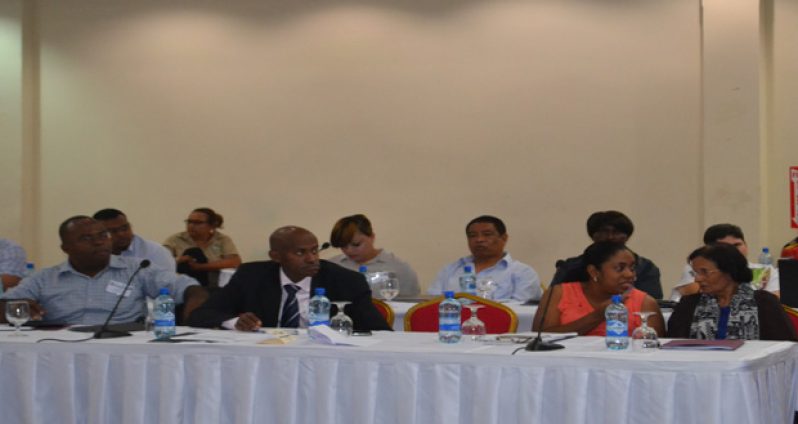By Alva Solomon
THE coconut industry in the Caribbean is a focal point and stakeholders within the region are meeting in Guyana to formulate a broad framework aimed at enhancing the industry by exploring market and technical avenues.This is being undertaken through the Coconut Industry Development for the Caribbean Project, a Euro$3.5M initiative backed by the European Union (EU) and which is overlooked by the Geneva-based International Trade Centre (ITC) in partnership with its key partner, the Caribbean Agricultural Research and Development Institute (CARDI).

NINE REGIONAL TERRITORIES
A two-day workshop, which began yesterday at the Ramada Georgetown Princess Hotel at Providence, East Bank Demerara, has seen participation of stakeholders from nine regional territories, including Guyana, Jamaica, St Vincent and the Grenadines and Trinidad and Tobago, among others.
Local and regional coconut processors and regional government representatives are involved in the discussions.
CARDI’s Executive Director, Barton Clarke, told the Guyana Chronicle that the project which began in 2014 centres on the development of the coconut industry in the Caribbean and originated from a study which was presented at the Caribbean Week of Agriculture activities in Guyana some three years ago. “Pursuant to that, a partnership was established between CARDI and the ITC for the implementation of the project for which we are gaining support from the European community.”
He said that CARDI appreciates the support from the EU and the ITC. “This is about looking at trade issues, market issues as well as looking at technical issues,” he said of the project. “The objective is to propel the industry,” Clarke said.
IMPROVING PRODUCTIVITY
He noted that CARDI’s role in addressing the technical issues associated with the project is to improve productivity at the level of the farms, addressing issues of integrated pest management solutions to the various pest and diseases, as well as to identify new varieties selected from within the existing Caribbean coconut population.
Clarke said the essential aim of the project is to improve productivity and market share as regards coconut water and coconut oil. Optimistically, he said, the project will also see an increase in the level of incomes which will trickle down to the farmer.

opening of the workshop yesterday
“At this juncture, we are concentrating on trying to get the framework right,” he noted. He noted that in order to develop the industry further, there is need for effective partnerships and he noted the importance of the roles of the private sector, farmers, service providers, extension officers and in Guyana’s case the National Agricultural and Extension Institute (NAREI).
The ongoing project has seen the documentation of coconut farms in each territory, to decipher whether the farmers are young or old, how many coconuts are harvested on the farms, among other pieces of vital information.
“This is going to provide us with a baseline type of information to allow us to understand what are the issues and the problems that the farmers have, so that we are better able to map our strategy,” Clarke said.
He noted the issues facing coconut farms across the region, including the red palm-mite disease affecting farms in Guyana, as well as the momentous task facing the industry in Dominica, against the backdrop of Tropical Storm Erika which devastated that island last year.
As regards the input and responses from regional governments to the project, Clarke said that based on the economic signals that CARDI has received, the Caribbean Community (CARICOM) has listed coconuts as one of its priority agriculture projects. “We would not [have] been able to enable the partnership with the ITC if we did not have the blessings of the government,” he added.

opening of the workshop yesterday
ITC’s, Senior Trade Promotion Officer, Matias Urrutigoity, noted that since the project began industry players have been examining and considering market options and linkages with different types of buyers and how to develop the coconut sector in Guyana and the Caribbean. This includes the impact of such development on the farmers in the sector. He said the project is aimed at improving the production of coconut products and overall industry advancement.
MARKET EXPERTISE
Hernan Manson of the ITC told this newspaper that the international body is bringing to the table its market expertise. “We know how markets are evolving and together with our farmers we are capable of identifying the measurable market trends and concrete market opportunities,” Manson said. He noted also that the ongoing forum is a participatory process for different players to engage in the sector and to gain different support from different institutions.
“So we hope that together [with CARDI] we bring different expertise to this project and this will translate into a better positioning of the coconut sector in the Caribbean in the future years,” Manson said.
During the early session, Ajmal Abdulsamad of the Centre of Globalisation, Governance & Competitiveness at Duke University, informed participants of the current state of the coconut industry and factors which impact its development.
VALUE-ADDED PRODUCTS

Dr Leslie Chin (right ) , CARDI’s Executive Director Barton Clarke
(second right ), CARDI’s Regional Project Coordinator Compton
Paul (third right ) and Research Analyst Ajmal Abdulsamad (left)
Abdulsamad is currently undertaking research on global market opportunities, using a value chain framework. He recommended that the coconut industry stakeholders, including policy-makers, work together to develop best methods to reorganise the industry’s structure so that it becomes cost-efficient. He also urged that the industry players invest in the conversion of coconut by-products into value-added products which he noted will come to the country’s benefits.



.jpg)










